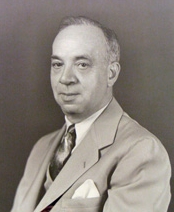Philip Perlman
Philip Benjamin Perlman (born March 5, 1890 in Baltimore , Maryland , † July 31, 1960 in Washington, DC ) was an American politician ( Democratic Party ), lawyer and United States Solicitor General .
biography
After attending Baltimore City College in 1908 , Perlman , who came from a Jewish family, first studied at Johns Hopkins University and then law at the University of Maryland's School of Law , where he graduated in 1912. While still a student, he worked as a journalist for The Baltimore Evening Sun and first as a reporter in 1910 and then between 1913 and 1917 as editor of the local section. In 1911 he was admitted to the Maryland bar .
In 1917 he was appointed assistant to the Attorney General of Maryland, before he was Secretary of State and State Treasurer of Maryland between 1920 and 1923 . After a subsequent activity as a solicitor from Baltimore from 1923 to 1926, he worked as a lawyer. He also became involved socially and politically as a board member of the United Jewish welfare rides ( Associated Jewish Charities ), the Baltimore Symphony Orchestra and as a curator (trustee) of the Baltimore Museum of Art .
After the end of the Second World War , Philip Perlman was appointed Solicitor General by US President Harry S. Truman in July 1947 and held this office until August 1952. In this capacity, he ordered the temporary suspension of the executions of seven convicts of the so-called Einsatzgruppen trial on February 15, 1951 after intervention by their lawyer Warren Magee in Washington.
Web links
- Philip Perlman in nndb (English)
| personal data | |
|---|---|
| SURNAME | Perlman, Philip |
| ALTERNATIVE NAMES | Perlman, Philip Benjamin |
| BRIEF DESCRIPTION | American politician and lawyer |
| DATE OF BIRTH | March 5, 1890 |
| PLACE OF BIRTH | Baltimore , Maryland |
| DATE OF DEATH | July 31, 1960 |
| Place of death | Washington, DC |


